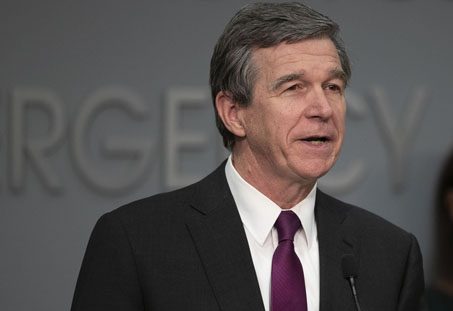Editorial: Cooper should make changes to COVID-19 rules
Published 12:00 am Sunday, February 21, 2021

- Gov. Roy Cooper earlier issued an executive order to the SBI to improve background checks for firearm purchases. (Robert Willett/The News & Observer via AP/File)
In North Carolina, it’s time to refine or lift some COVID-19-prompted restrictions.
Case numbers have plummeted from their peak at the start of the year. While supplies are still limited, the state is making good progress toward vaccinating significant portions of the most vulnerable (39% of people 65 to 74 and 31% of people 75 and older). Gov. Roy Cooper can make reasonable changes without significantly raising the risk of transmission.
First on the list should be refining the 10 p.m. curfew to more narrowly target businesses and institutions that pose a risk or lifting the restricting entirely and implementing more strict rules where needed. If the goal is to prevent people from gathering entirely, the 10 p.m. curfew does not do that.
People can spread COVID-19 whether they’re with a few friends or a few dozen. They can spread the virus whether they’re in a private residence or a restaurant. Current regulations have done little to prevent the latter or provide incentives to comply.
Existing regulations have largely operated on an honors system, with some good examples of enforcement. Here, law enforcement has understandably focused on crime and chosen to issue warnings and educate when called out to a business or gathering location. However, there are many more examples of people willingly flouting COVID-19 rules than law enforcement could ever hope to respond to. Others are ignorant about current rules because social media allows people to stay in their own curated silos and ignore things they don’t like.
It’s troubling to watch videos like those posted by Rowan County’s Darrell Harwood last week showing his band’s performance to a large crowd at Apps & Taps, a Mooresville establishment, with hardly a mask in sight. Even if everyone in the room was vaccinated or tested for COVID-19 before attending, Harwood is a public figure and should set a good example for others.
Reasonable people might ask: How will loosening restrictions help?
In this case, it’s best to be targeted. Consider gyms and other fitness businesses that might traditionally be open until midnight or 24 hours. The hours are often designed to help people who work late hours or prefer to exercise when there are fewer people around, which further reduces chances of getting COVID-19. Because of the limited number of people who would take advantage of this change, it would not have a major effect on the spread of COVID-19.
Cooper should also allow more than 100 fans at high school football games, which take place outdoors and in facilities that allow for social distancing. At a minimum, rules should allow each player on either team to have two people present. This ensures parents, grandparents, other family members or close friends get to see their loved ones play — something that will be particularly important for seniors.
In most cases, high school football stadiums could comfortably allow more than two attendees per player without posing a significant danger of spreading COVID-19, especially if masks are mandatory.
Senate Bill 116, introduced last week, would increase the capacity for outdoor sporting facilities to 40% of the approved occupancy under the fire code and no more than seven people for every 1,000 square feet. Cooper can prevent the need for the bill by simply making changes when his current executive order expires this week.
Plenty of people will make the case Cooper can do more to get schools back to five days per week with in-person classes, but the best setup for K-12 may be what Rowan-Salisbury Schools has maintained since the start of the year — two cohorts of students alternating days of the week for attendance in person. The proof of whether local students did better than others in the state ultimately will be in the data, but it has provided consistency that balances the need for in-person learning with worries about health. Districts can already choose the model being used by RSS under current restrictions.
Because most groups of people are still weeks or months from receiving a vaccine, the state needs to keep many restrictions in place. There’s no need, however, to maintain all of the state’s current COVID-19 restrictions for much longer.
As for people who still haven’t gotten on board with saving lives from the scourge of COVID-19, harsher restrictions or more stringent enforcement of existing rules may be needed.


